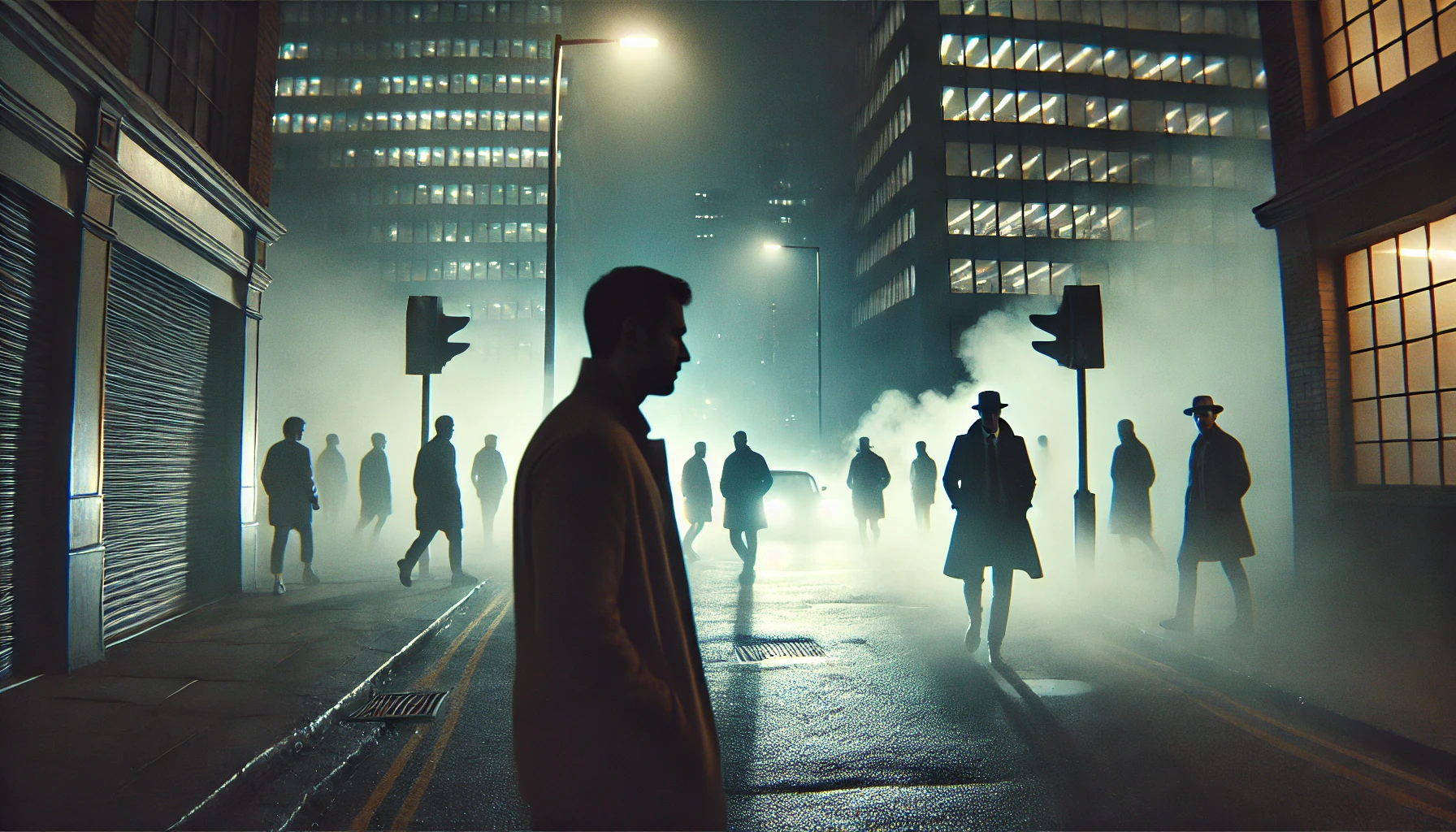Elias’s life had always been about adjusting, blending in just enough to avoid drawing attention. He’d learned early on to watch carefully, mimic others’ ways of talking, laughing, reacting. People seemed to follow a set of rules, and all he had to do was pick up on them, follow them, and slip through unnoticed.
Yet, there were moments—a strange, hollow ache when he was alone—when he wondered who he was when he wasn’t being someone else.
One night, Elias attended a gathering at a coworker’s home. As he entered, he picked up on the cues immediately—the loud jokes, the easy laughter. Everyone seemed relaxed, and Elias quickly fell into the rhythm. A round of drinks flushed his face, loosening his smile. For tonight, he could relax. All he had to do was play along.
Elias stood at the edge of the room, holding a drink he didn’t remember ordering. People moved in practiced patterns, their conversations darting with an energy he couldn’t fathom. He strained to catch the invisible rhythm guiding them, waiting for something, anything, to tell him how to enter.
People glanced over, read his smile, his well-placed nods as markers of belonging. They went on talking, assuming he knew the dance. Elias gave them what they wanted to see—borrowed gestures and subtle expressions, the results of careful study. The method worked, until a man in a gray suit approached, smiling as if he recognized him.
“Good to see you here, Elias,” the man said with a nod.
Elias tensed; his hand tightened on his glass. How did this man know his name? He grasped for a story, any story, to complete the stranger’s expectations. Smiling, he answered, “I was wondering if I’d see you here.”
The man laughed, pleased. “Of course! You know me—couldn’t resist showing up. How’s everything with you?”
As they spoke, Elias tried to catch the rhythm beneath the man’s words. But each response he gave felt like a gamble, every word a step into unknown territory. He answered with vague hints, a mask that cracked only slightly under the weight of his effort.
Around him, people laughed and gestured wildly, unaware of the weight Elias carried. To them, he was just another fellow traveler, a person as fully-realized as they were. Only he knew the road was dark and full of turns he couldn’t navigate. Every time he spoke, his mind tracked reactions to confirm he was playing his role well enough.
But just as he settled in, he noticed the host—a woman with striking green eyes—chatting nearby. She wasn’t laughing as openly as everyone else. Instead, her expression was calm, her tone quiet, yet everyone seemed drawn in. The rules around her felt different. Elias watched her, trying to pick up on her subtleties.
As the party wound down, Elias found himself walking toward her. They struck up a conversation, and he soon realized she didn’t respond to the usual jokes and cues. She was perceptive, nodding here, laughing softly there, as though she could see right through his carefully built expressions.
“So,” she said softly. “What do you actually like to do, Elias?”
The question caught him off guard, and he laughed to cover his hesitation. “Oh, you know…whatever keeps me out of trouble.”
Her gaze lingered, unwavering, and for a brief second, he felt seen. Really seen. It was almost too much. He left soon after, his mind buzzing with a question he couldn’t shake: What if she knew? Knew that his smile was practice, that his reactions were echoes of everyone around him? The idea haunted him for days, lingering like an itch he couldn’t scratch.
A month later, Elias found himself at a café with Annabelle, a woman who laughed brightly and made each moment feel charged with a strange newness. She sat across from him, sipping her coffee with easy grace, her eyes sparkling as she described her weekend. Elias nodded, giving her the occasional word of encouragement. She didn’t seem to mind that he mostly listened, watching her, absorbing her mannerisms, her easy way with words.
Annabelle seemed to like him. Elias couldn’t see why. But her laughter made him feel lighter, as if some of his tension was slipping away. He memorized her gestures, her interests. The patterns seemed clear until she said something he didn’t expect.
“You don’t have to pretend around me, you know,” she said casually, though her gaze was piercing.
Elias froze. The word ‘pretend’ echoed in his mind all the way home.
His routines began to feel heavy, like an ill-fitting jacket. He kept up his act, imitating others’ behaviors, but for the first time, he felt disconnected. He was getting better at fitting in, but worse at feeling anything genuine. He watched himself, a performer in a play he didn’t understand.
One day at work, a client meeting turned tense. Elias had practiced his charm, picking up on the client’s interests, mirroring their enthusiasm. But his coworker, Henry, didn’t play along. Henry was blunt, even rude. Elias’s smile faltered, a wave of anxiety creeping in.
To his surprise, the client respected Henry’s bluntness. By the end of the meeting, Henry had secured the deal, while Elias felt exposed, his careful approach seeming ridiculous. So, the rules don’t always work, he thought, a tightness forming in his chest.
That night, Elias wandered the city. He looked at the people around him, trying to imagine their “rules.” He noticed how different they were: the bold laughter of a couple; a man walking briskly, muttering; an older woman pausing as if lost in thought. No one seemed to follow a single script.
The rules he’d adopted blurred, each contradicting the other. And that night, he asked himself, What if I have no rules of my own?
Elias’s world had always been meticulously constructed, piece by piece, like a complex puzzle where each person, each mask, fit into its own designated space. But in the weeks following the talk with Anabelle, something cracked in that perfect image. He could still walk into rooms and adapt his expressions, shape his words, respond as expected. But increasingly, it felt like he was walking through fog, straining to keep track of who he was supposed to be.
At work, he noticed the edges of his carefully maintained composure fraying. During a meeting, a colleague he’d often sparred with half-jokingly pointed out an error in his presentation. It was a minor oversight, easily dismissed. But Elias found himself frozen, hearing the comment echoing louder and louder in his mind. He felt a rush of heat, a tingling discomfort that crept up his spine as he struggled to keep his face neutral. He could feel everyone’s eyes on him, waiting for his smooth, disarming reply. But the words that came felt hollow. Forced. And for the first time, he saw the flicker of something in his colleagues’ faces: confusion, maybe even a hint of impatience.
Later that evening, Elias sat alone in his dimly lit apartment, his mind replaying the meeting. How had he let his mask slip? He felt a gnawing sense of vulnerability, as though the slightest misstep would expose him completely. In a desperate attempt to feel in control, he rehearsed his reactions in the mirror, testing different versions of himself, each with a slightly varied tone, a different tilt of the head. But none of it felt right. Each version felt like a mask layered over a void, as if he were reciting lines he no longer understood.
His relationships fared no better. Friends he’d once entertained with witty banter now felt more like spectators, as if they were there solely to witness his unraveling. In conversations, he would find himself momentarily blank, the mask slipping before he could reshape it. Laughter would bubble up around him, but instead of joining in, he found himself watching, separate, alien. People began noticing too, asking if he was tired or distracted. The more they questioned him, the more he withdrew, slipping into a strange, quiet isolation within himself.
In the middle of one particularly tense week, he met Annabelle for a coffee. She greeted him with her usual warmth, but as the conversation wore on, he sensed her watching him carefully, her gaze searching. For once, he couldn’t quite hold eye contact, couldn’t perform the easy confidence she was used to. When she asked how he was, he forced a smile and told her he was fine, but his voice sounded tight, strained even to his own ears. And she saw through it.
“Elias,” she said softly, her brow furrowing, “I feel like you’re somewhere else lately. Are you okay?”
He felt the words catch in his throat, a sudden and overwhelming feeling of exposure. His instinct was to laugh it off, to reassure her that everything was fine. But even the thought of doing that exhausted him. He was tired—tired of trying to maintain a version of himself that seemed to be crumbling from the inside out. For a moment, he felt an urge to confide in her, to tell her about the strange emptiness, the creeping sense that he didn’t really know himself. But instead, he mumbled a vague answer and turned the conversation to a safe, familiar topic. He saw the flicker of disappointment in her eyes, but he pushed it aside, unable to confront it.
When he got home that evening, he stood in front of the mirror and studied his reflection. There was a faint tremor in his hands, his eyes bloodshot from lack of sleep. He looked like a stranger, a pale version of himself, as if all the color had drained away. In a fit of frustration, he ripped off his suit jacket and threw it across the room, feeling a surge of anger rise up. Why couldn’t he just be one thing, one person, without all these layers and masks?
He pressed his hands against the bathroom sink, his knuckles white as he gripped the edge, his reflection blurred and wavering in the dim light. His chest felt tight, the weight of his own identity pressing down on him, crushing him from all sides. The fragments of who he thought he was—Elias the charmer, Elias the confident professional, Elias the loyal friend—all felt like separate people, none of them whole, none of them him.
As the days went by, Elias’s breakdown deepened. He began avoiding people altogether, calling in sick, ignoring messages from friends. It was easier to disappear than to face the mounting pressure of holding up a crumbling mask. He’d always believed he could be anyone he wanted to be, could shape himself to fit any mold. But now, he felt like he was slipping, losing his grip on every identity he’d ever crafted.
One sleepless night, as he sat staring at the ceiling, he realized with a jolt of terror that he didn’t know who he was beneath the masks. There was no core self, no foundation. Just an empty, shifting void. His entire life had been a series of performances, each one carefully curated, but now, stripped of his roles, he felt like a hollow shell, an actor without a script.
And yet, somewhere in that void, in the vast emptiness of his unmasked self, there was a faint glimmer of something else. It was terrifying and raw, a feeling of complete exposure, but it was also strangely liberating. For the first time, Elias wondered if maybe, just maybe, there was more to him than the roles he played.
Elias soon met Lila, a lively, bold woman who shared her stories with unabashed openness. Elias found himself drawn to her, thinking, This is someone who knows who she is.
One evening, though, Lila grew quiet. “I’m so tired of keeping it all together,” she said softly, eyes downcast. Elias looked at her, startled, as she confessed how often she felt like she was performing, too. “Sometimes I think I’m just as lost as anyone else.”
Hearing her, Elias felt something break open. The façade he’d held onto for so long—the careful mimicry, the rules he’d gathered from others—suddenly seemed unnecessary. He wanted to tell her he understood, that he felt the same, but he held back, unsure if he could.
She was different, in a way that defied his models. Her gaze steady, listening with warmth, and, without knowing why, he began to talk. In halting, awkward words, he confessed that he sometimes felt like a ghost in his own life, passing through others without ever truly connecting.
Lila didn’t look away. Her voice was soft as she said, “Everyone wears a mask sometimes.”
A warmth spread through him. He’d always thought his pretending was his alone, a secret setting him apart. But here, he was hearing it from another, like an echo of his own thoughts. For a moment, he felt less alone.
But just as suddenly, the walls came back up. He’d let his guard slip, and his heart tightened in fear. What if she saw through him now? What if she saw how empty he was beneath the words he’d so carefully chosen? The fear paralyzed him, his tongue growing heavy, and he pulled back.
But the memory lingered, a tiny point of warmth in the shadows, something he could return to in the quiet moments when he doubted himself.
In the following weeks, Elias grew drawn to people who didn’t follow norms. He noticed how they moved, unbothered by what others thought. One coworker, Alex, was known for his unpredictability.
“Alex,” Elias asked one day, “how do you decide how to act? What to do in situations?”
Alex laughed, raising an eyebrow. “Decide? I just go with what feels right at the time.”
“But what if you get it wrong?” Elias pressed. “Don’t you ever worry?”
“Sure,” Alex replied. “But everyone’s guessing. The trick is to not let it bother you.”
Alex’s words shifted something within him. He’d always assumed he was the only one without a set of rules. But what if everyone was guessing, too?
Months passed, and in small but deliberate ways, Elias began experimenting with his interactions. At first, it was subtle—allowing a pause after someone asked him a question rather than filling the silence with a rehearsed response. Sometimes, people seemed taken aback, waiting for him to say something more. He felt a flush of nerves in those moments but resisted the urge to retreat.
One day, he joined a group outing with his colleagues, a mix of familiar faces and new ones. Normally, he’d cling to the edges, observing and calculating, but tonight he leaned in, asking questions he was actually curious about, without concern for how they might land. The energy around him shifted. People responded to him—not the version of him he’d crafted so carefully but something that felt closer to real.
When someone told a joke, Elias laughed, not because it was what he was supposed to do, but because he genuinely found it funny. For the first time, he noticed how much lighter his laughter felt, how the sound seemed to echo in his chest. He’d never realized how laughter could feel warm, could reach inward and tug at something solid, something deeply his. And people seemed to respond differently to him too, as if sensing the shift. His interactions flowed without effort, his words blending naturally into the conversation.
There were still days he slipped into old habits, of course. Times he’d watch himself in the mirror, wondering if he’d overstepped, if he’d shown too much. But gradually, he found a gentler understanding of himself—he was just a person trying to find his way, like everyone else. Each time he felt that familiar pang of self-doubt, he’d recall Lila’s quiet, knowing smile, her words still a source of comfort: “Everyone wears a mask sometimes.”
One evening, Elias returned to the café where he’d last met Annabelle. He sat at their usual table, feeling an unexpected sense of calm. This time, he ordered his favorite drink instead of something he thought she’d expect him to like. He took in the scene—the clinking of cups, the murmur of conversation, the soft glow of the streetlights outside. For the first time, he felt rooted in his own presence, like he was exactly where he was supposed to be, not because he’d adjusted himself to fit in, but simply because he was there, fully, as himself.
And there, amid the laughter and chatter of strangers, Elias found an unexpected kind of peace. The masks, he realized, were always there for him to wear when he needed them. But they didn’t define him. He’d outgrown them, or perhaps they’d just become looser, less restrictive. Now, they felt more like tools—a bit of armor, something he could reach for if he needed to navigate tricky waters. But he could set them down just as easily.
In that café, Elias realized that life was not about blending into someone else’s rhythm. It was about learning his own, one beat at a time. And even if he wasn’t sure exactly what that rhythm sounded like, he was finally ready to listen, to stumble, to find it. He wasn’t an echo of someone else’s world anymore. He was stepping into his own.
As he sat there, letting the hum of life move around him, Elias smiled—not the practiced smile he’d perfected over years, but a simple, genuine smile, one that felt like a small but real start.



